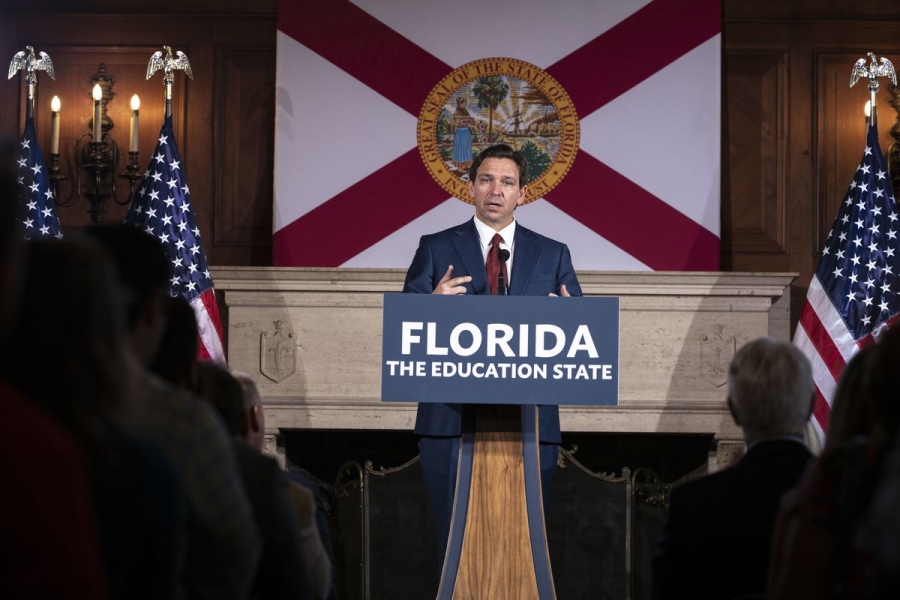DeSantis’s Florida bills targeting LGBTQ people, abortion rights, and teachings on race preview his presidential platform.

In launching his 2024 presidential campaign, Florida Gov. Ron DeSantis promised to champion a new, expansive conservatism. To understand exactly what that would look like, you only need to look to Florida itself.
This legislative term, the governor and his fellow Republicans waged culture wars everywhere from the classroom to the bathroom to Disney World, making the state a pioneer of some of the most extreme right-wing policies in the US.
DeSantis’s legislative agenda in Florida — which he has framed as a “blueprint” for America — has targeted immigrants, LGBTQ individuals, Black Americans, and women, as well as the corporations who come to their defense. And state lawmakers have advanced DeSantis’s own political career at the expense of transparency and accountability. That’s all been done in the name of wooing an activist GOP base, which still loves former President Donald Trump and has given him a historically large lead in Republican primary polls.
“What’s been happening … in Florida should scare every single person across the entire country,” US Rep. Maxwell Frost (D-FL) said in a press call. “Gov. Ron DeSantis running for president and even being within striking distance of the Oval Office should frighten anyone who values democracy, voting rights, civil rights, freedom, and the pursuit of happiness.”
Many of the Florida laws passed this session, which concluded earlier this month, go further even than other red states. Proposals banning gender-affirming care for minors and establishing a six-week abortion ban, for example, impose harsh new restrictions that could have severe consequences on those seeking such care in the state. Immigration proposals targeting undocumented people have also inspired fear among the roughly 772,000 undocumented immigrants in the state, and prompted some to leave.
The attacks on LGBTQ rights and Black Americans via policies that restrict the teaching of systemic racism and trans people’s ability to use bathrooms have been so harsh that civil rights groups like the NAACP and Equality Florida have cautioned people against traveling to the state. Some of those groups are challenging laws DeSantis has signed in court.
DeSantis has nevertheless doubled down on those policies.
“I think that the culture wars are front and center right now. People are talking about it more than economic issues, more than national security, foreign policy. So I think DeSantis has set himself up nicely,” said Brendan Steinhauser, a GOP strategist based in Texas.
A representative for DeSantis’s office did not immediately return a request for comment.
It’s not clear that pursuing an ultraconservative agenda actually serves DeSantis politically in the long-run. Florida Republicans have legislated so far to the right that there is concern among some GOP donors that DeSantis has gone too far and alienated voters who might have otherwise supported him in a general election.
“There’s a certain anti-Trump segment of the donor class has lined up with him, but another that is still looking for a candidate,” said Robert Cahaly, senior strategist and pollster at the Trafalgar Group and former Republican political consultant.
Here’s how Florida lawmakers have enacted DeSantis’s vision this session.
LGBTQ rights
DeSantis has been a key figure behind the national Republican campaign against LGBTQ rights, particularly that of children, with some of Florida’s policies being the first of their kind in the nation. Those policies serve a practical purpose for the GOP: They allow them to perform opposition to the “woke left” and ensure their social conservative backers show up to vote — even after the religious right achieved its decades-long goal of overturning Roe v. Wade last year.
- Gender-affirming care ban: DeSantis signed a law that imposes felony penalties on health care workers who provide gender-affirming care for minors. The law includes a unique provision that could allow some parents to ask Florida courts to override other states’ custody decisions for children receiving gender-affirming care, though it only applies to a narrow set of circumstances. Advocates are challenging parts of the law on an emergency basis in court, arguing that it violates parents’ fundamental rights to make medical decisions for their children and that it violates the Constitution by discriminating against transgender children.
- Bathroom bill: DeSantis has made it illegal for Floridians to use bathrooms and changing facilities that don’t correspond with their sex at birth.
- Gender identity: Florida expanded DeSantis’s controversial “Don’t Say Gay” law to place additional restrictions on the teaching of “human sexuality” through high school and to require that schools promote abstinence from sex outside of marriage and monogamous heterosexual marriage. That law also prevents schools from requiring that teachers use pronouns that align with their students’ gender identity and declares that it is “false to ascribe to a person a pronoun that does not correspond to such person’s sex.”
- Drag shows: He also signed a law that bars establishments from allowing minors to watch an “adult live performance” that “depicts or simulates nudity, sexual conduct, sexual excitement, or specific sexual activities.” Though the law is intended to target drag shows, many drag shows do not include any such content.
Abortion
As Vox’s Rachel Cohen explained, Florida is among the states that have approved a very stringent abortion ban, which significantly curbs people’s access to the procedure. It joins other Southern states in harshly curtailing reproductive rights in the region, eliminating Florida’s status as a destination for people seeking out such care.
- Six-week abortion ban: The legislature has approved a bill that bars most abortions after six weeks, with some exceptions for rape, incest, and the life of the mother. In cases of rape and incest, a person would have to provide documentation like a restraining order in order to obtain an abortion up to 15 weeks. The legislation would penalize physicians who knowingly violate its parameters with potential fines or jail time. The policy won’t take effect until the state’s Supreme Court makes a decision on its existing 15-week abortion ban.
Some Republican donors are concerned the decision to move forward with such an extreme abortion ban will cause DeSantis to face political blowback as he moves on the national stage. Although restrictions on abortion have been a chief focus of some conservative voters, voters overwhelmingly supported abortion access during the 2022 midterms, and there are signs protecting abortion access will be a salient issue in 2024.
Education
In addition to curbing education about LGBTQ rights and identity in schools, several of the Florida legislature bills have centered on limiting discussions about diversity and race. As Vox’s Fabiola Cineas explained, such measures follow a state push to reject the teaching of the AP African American Studies course in Florida.
- Banned public universities from funding DEI: One new law bars public colleges and universities from funding efforts that promote diversity, equity, and inclusion, also known as DEI. DEI programming typically examines disparities and focuses on how marginalized groups can be better represented in staffing or curriculum. Opponents of the law worry that it could drive away students and faculty, while supporters argue that such programs are used to quell dissent.
- Restrictions on higher education courses: A new policy also bans the state’s public colleges and universities from offering general education courses about “identity politics” and the idea that “systemic racism” is “inherent in the institutions of the United States.” This law expands restrictions DeSantis previously pushed in the K-12 system to higher education.
- Book banning: The legislature amplified the state’s efforts at book banning, with a new law that mandates that certain books can be pulled from school shelves for review within five days of a person flagging it as concerning. At least one Florida school district has already faced a lawsuit over its approach to book banning due to concerns that it violates free speech rights.
Immigration
Legislators approved a wide-ranging slate of immigration policies, which severely limit the ability of undocumented people to both work and travel in the state. These hardline proposals are intended to establish DeSantis’s credentials on an issue national Republicans have repeatedly hammered Democrats on.
DeSantis’s proposals have been slammed by immigration advocates, who note that the policies could severely hurt the state economically and drive its residents away.
“As fear becomes the norm in immigrant communities, a lot of these migrant workers will start leaving the state and looking somewhere else,” Samuel Vilchez Santiago, the Florida state director of the American Business Immigration Coalition, told Vox’s Christian Paz.
- Employment verification: A new law requires companies with 25 employees or more to check workers’ citizenship status using a federal portal known as E-Verify before hiring them. There are severe penalties, including daily fines, for companies that do not abide by this law. As Paz notes, this could have a devastating impact on 800,000 undocumented people who live in the state, and who may seek residency and employment elsewhere due to fears of deportation.
- Funding for migrant flights: There has been $12 million allocated for flights that DeSantis can use to transport migrants from Florida to other states. DeSantis gained national attention for flying migrants from San Antonio, Texas to Martha’s Vineyard; and now faces a lawsuit over that stunt.
- Invalidation of out-of-state IDs: A provision in the state’s new immigration reform package bars undocumented people from driving in the state of Florida regardless of whether they have a valid out-of-state license. The bill also imposes penalties on people who are transporting undocumented people in the state.
In addition to the expansive immigration package it approved, the legislature also passed a law that’s expected to harm Chinese immigrants in the state, with some local activists also telling Vox that people are considering moving as a result.
- Anti-China land ownership: Many Chinese citizens will soon be barred from owning property in the state. The law applies to people who are not US citizens and who are not legal permanent residents in the country. There is an exception for people with non-tourist visas, though it’s still very restrictive. The law also limits many citizens from other countries, including Russia and Iran, from purchasing farmland within 10 miles of a military site.
This law has raised fears of racial profiling of Chinese immigrants in the state overall and has already been challenged in court by the ACLU for being discriminatory.
Guns and crime
DeSantis has quietly catered to gun rights activists by loosening Florida’s gun laws and invoked what he describes as a “tough-on-crime” agenda that he has positioned as a model for the country, even though it’s not clear that crime is lower in Florida than in some of the blue cities he’s criticized.
- Permitless carry: DeSantis made Florida the 26th state to adopt permitless carry. The law, which goes into effect July 1, allows gun owners to carry a concealed weapon without a permit or without undergoing training, with some restrictions. Previously, gun owners applying for a permit to carry a concealed weapon were required to undergo a background check, fingerprinting, and training, and to demonstrate competency by firing a gun in front of an instructor.
- Death penalty: DeSantis signed laws lowering the number of jurors required to recommend the death penalty from 12 to eight and allowing child rapists to be sentenced to the death penalty. The latter law conflicts with a 2008 US Supreme Court decision that explicitly prohibited the use of the death penalty in child rape cases when the child survives on the basis that it would disincentivize victims to come forward and put them in mortal danger. DeSantis has said he is prepared to “take this law all the way to the US Supreme Court.”
- Anti-liberal bail reform: DeSantis signed a law that prevents a judge from entering bail that is lower than prescribed by the Florida Supreme Court and barring individuals charged with violent or heinous crimes from being released before their first court appearance. That’s despite the fact that cash bail does not deter pretrial crimes nor impact whether defendants appear in court, and conversely, reducing reliance on cash bail does not increase pretrial misconduct, a 2022 paper found.
Targeting “woke” corporations
The Florida legislature has propped up DeSantis’s battles against what he calls “woke” corporations that embrace progressive social justice policies, including Disney, the state’s largest taxpayer.
- Disney: DeSantis signed a law nullifying an agreement that would have allowed Disney to continue to develop and maintain its theme parks in Florida with relative independence. Disney consequently sued DeSantis for waging a “relentless campaign to weaponize government power” over the company. It’s part of a long-running feud between the governor and Disney, which started when company executives spoke out last year against what critics call Florida’s “Don’t Say Gay” law, which bans classroom discussion of gender identity and sexual orientation.
- Countering ESG investing: DeSantis has also signed a law barring state officials from investing public money to promote environmental, social, and governance goals, such as ensuring employees have good working conditions or combatting climate change. Republicans have framed ESG investing, the subject of Biden’s first veto, as another symptom of “woke” corporatism.
Democracy
Florida legislators have passed bills changing the state’s election laws and public records requirements in a manner designed to politically benefit DeSantis.
- Public records: DeSantis signed a law eliminating the requirements to report where he goes and who he meets with in an official capacity, insulating him from public scrutiny as he launches his presidential campaign.
- Campaign finance: DeSantis signed a law that relaxes campaign finance reporting requirements for state political committees, which currently disclose their fundraising figures monthly. That applies to DeSantis’s state political committee, Friends of Ron DeSantis, which reported about $86 million cash on hand as of the end of April.
- Scrapping Florida’s “resign-to-run” requirement: The same bill also explicitly allows DeSantis to run for president without having to resign from his position as governor, as may be required under preexisting Florida law.
- Another attack on voting rights: Finally, the bill introduces new fines for outside voter registration groups and requires they provide a receipt when they help someone fill out a voter registration application — a measure that Democrats say could have a chilling effect on minority voters who tend to register through these groups.
Source: vox.com






